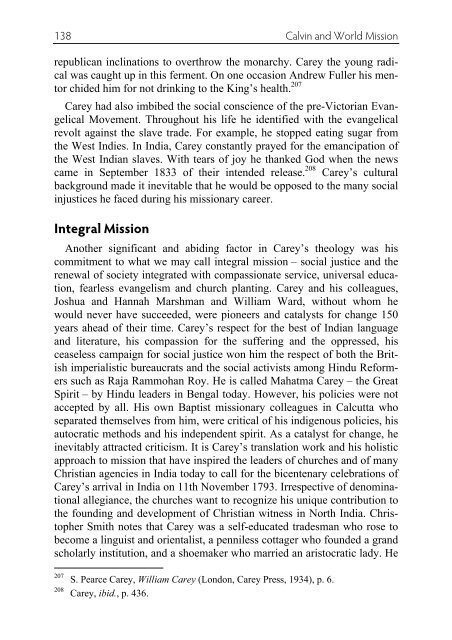Calvin and Missions - World Evangelical Alliance
Calvin and Missions - World Evangelical Alliance
Calvin and Missions - World Evangelical Alliance
Create successful ePaper yourself
Turn your PDF publications into a flip-book with our unique Google optimized e-Paper software.
138 <strong>Calvin</strong> <strong>and</strong> <strong>World</strong> Mission<br />
republican inclinations to overthrow the monarchy. Carey the young radical<br />
was caught up in this ferment. On one occasion Andrew Fuller his mentor<br />
chided him for not drinking to the King’s health. 207<br />
Carey had also imbibed the social conscience of the pre-Victorian <strong>Evangelical</strong><br />
Movement. Throughout his life he identified with the evangelical<br />
revolt against the slave trade. For example, he stopped eating sugar from<br />
the West Indies. In India, Carey constantly prayed for the emancipation of<br />
the West Indian slaves. With tears of joy he thanked God when the news<br />
came in September 1833 of their intended release. 208 Carey’s cultural<br />
background made it inevitable that he would be opposed to the many social<br />
injustices he faced during his missionary career.<br />
Integral Mission<br />
Another significant <strong>and</strong> abiding factor in Carey’s theology was his<br />
commitment to what we may call integral mission – social justice <strong>and</strong> the<br />
renewal of society integrated with compassionate service, universal education,<br />
fearless evangelism <strong>and</strong> church planting. Carey <strong>and</strong> his colleagues,<br />
Joshua <strong>and</strong> Hannah Marshman <strong>and</strong> William Ward, without whom he<br />
would never have succeeded, were pioneers <strong>and</strong> catalysts for change 150<br />
years ahead of their time. Carey’s respect for the best of Indian language<br />
<strong>and</strong> literature, his compassion for the suffering <strong>and</strong> the oppressed, his<br />
ceaseless campaign for social justice won him the respect of both the British<br />
imperialistic bureaucrats <strong>and</strong> the social activists among Hindu Reformers<br />
such as Raja Rammohan Roy. He is called Mahatma Carey – the Great<br />
Spirit – by Hindu leaders in Bengal today. However, his policies were not<br />
accepted by all. His own Baptist missionary colleagues in Calcutta who<br />
separated themselves from him, were critical of his indigenous policies, his<br />
autocratic methods <strong>and</strong> his independent spirit. As a catalyst for change, he<br />
inevitably attracted criticism. It is Carey’s translation work <strong>and</strong> his holistic<br />
approach to mission that have inspired the leaders of churches <strong>and</strong> of many<br />
Christian agencies in India today to call for the bicentenary celebrations of<br />
Carey’s arrival in India on 11th November 1793. Irrespective of denominational<br />
allegiance, the churches want to recognize his unique contribution to<br />
the founding <strong>and</strong> development of Christian witness in North India. Christopher<br />
Smith notes that Carey was a self-educated tradesman who rose to<br />
become a linguist <strong>and</strong> orientalist, a penniless cottager who founded a gr<strong>and</strong><br />
scholarly institution, <strong>and</strong> a shoemaker who married an aristocratic lady. He<br />
207 S. Pearce Carey, William Carey (London, Carey Press, 1934), p. 6.<br />
208 Carey, ibid., p. 436.

















